If your fur-baby has a bad case of stinky dog breath, it can take a little bit of the joy out of pet parenting. But there are easy ways to treat stinky bog breath to help bring your and your furry friend closer together.
That loveable little mutt of yours is just fur-covered love, and they want to show it as often (and as up close and personal as possible). Yes, puppies are super cute (no matter their age or size). But, sometimes, that loving comes with a little something unpleasant on the side – bad dog breath.
Charlie, our little (well… medium sized) fur ball is a loveable mix of beagle, spaniel, with a tiny bit of shih-tzu swirled in for good measure.
He loves spending time with us and can often get VERY up close and personal.

Josh Billings
But lately, I’ve noticed a less-than pleasant aroma emitting from his mouth. And it was making that personal time a little less loveable.
So, I went on the hunt to try to figure out what to do in order to help improve his breath without having to resort to going to the doggy dentist. After all, the little guy is only a little over 2 years old.
I decided I’d share what I find with you – dear readers – in case you find any of these possible tricks, tips, and hacks handy while dealing with your own stinky dog breath issues.
The first step was trying to figure out what was causing his stinky dog breath.
After all, bad dog breath isn’t just unpleasant for us. It can also be an early warning sign of a serious health problem. That’s why I wanted to do some research before I looked into ways to cover up the stench.
We dog owners often assume that bad dog breath just comes with the territory, but that isn’t always the case.
What Causes Stinky Dog Breath?
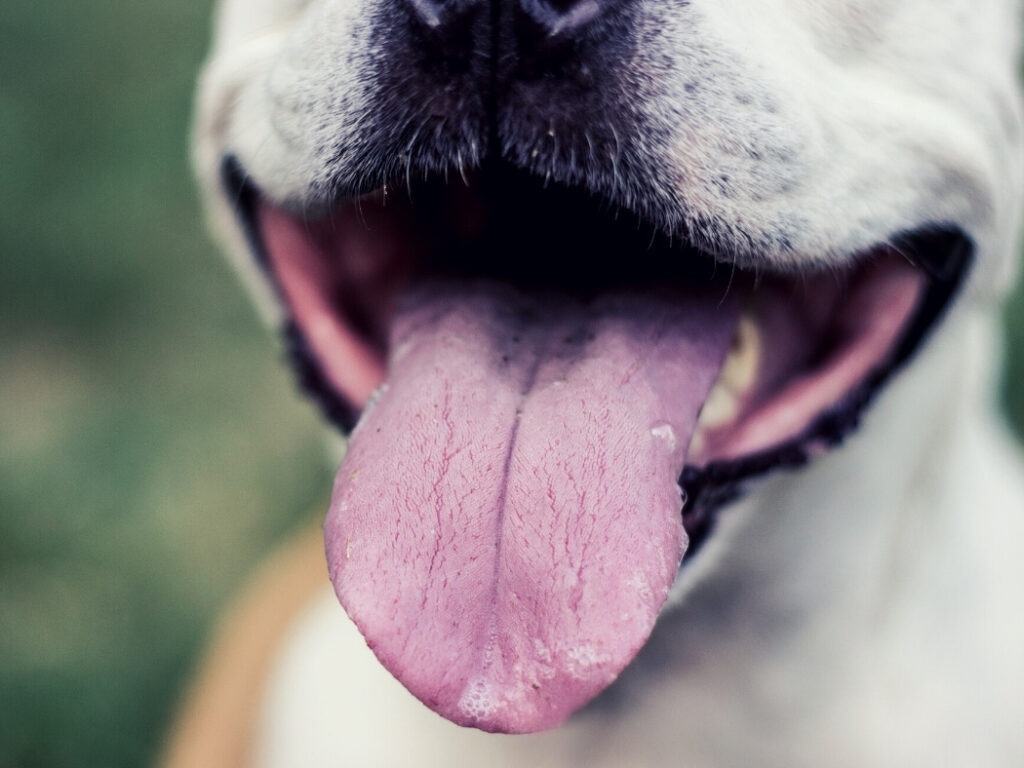
Therein lies possibly the least mysterious of all mysteries.
While the severity of stinky dog breath can vary based on the cause, the simple fact is that we – as pet parents – usually don’t do enough to keep our dog’s breath fresh and clean.
No, it isn’t always easy to do. After all, have you actually tried brushing a dog’s breath? I have. It wasn’t fun. They also say that you smell like what you eat. Well, at least their breath often smells like their food.
But poor dental hygiene or a particularly unpleasant diet aren’t the only causes, so you should be on the lookout for some signs of other possible issues.
Here are the 6 most common causes of bad dog breath.
Improper Oral Hygiene
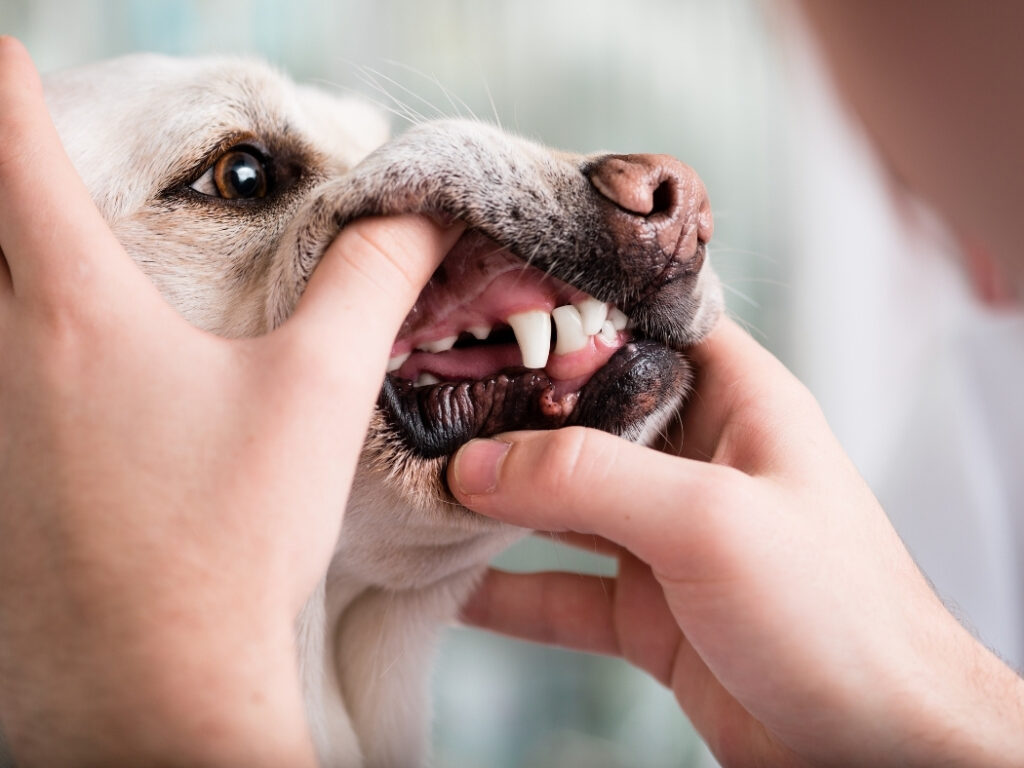
The most common reason why your dog’s breath is a bit on the rank side is just because of bad oral hygiene. After all, your breath would probably stink that bad too if you didn’t brush your teeth – ever.
An excessive build-up of plaque and tartar can lead to the development of the bacteria that causes stinky dog breath.
Even if your dog is a chewer, he or she may not be chewing enough – or the right things – to break away all of the plaque that is causing bad breath.
Luckily, this is also the easiest to address. And – for those who are wondering – this did turn out to be Charlie’s problem.
He is a mighty chewer, but he simply wasn’t chewing away the bits and pieces that were causing some stank!
Periodontal Disease
If left untreated, poor oral hygiene can develop into a serious case of periodontal disease. This is when an excess of plaque and tartar build-up cause the gums to push away from the teeth, exposing new areas for bacteria to develop.
This happens in people too, which is why we should all go to the hygienist for regular cleanings.
Not only can (and it usually will) periodontal disease lead to inflamed gums, but it can also cause cavities to develop or more serious infection that can turn into tissue destruction, the formation of pus, and – eventually – tooth loss.
However, this isn’t your garden variety of stinky dog breath. This is a special level of airborne hell that you need to witness to understand.
A friend of mine had a Schnauzer with a serious case of periodontal disease, and you could smell that little dog’s breath from a mile away. It got so bad, that it ended up costing her around $2,500 in dental care to bring her little dog’s breath back from the brink of post-apocalyptic zombie mouth.
Diabetes
Continuing on the “worst-case scenario” train, another cause of stinky dog breath is canine diabetes.
This one is – again – noticeably different, and you should be able to detect a sweet or fruity smell in your dog’s mouth. Because this is a serious – but treatable – condition, you should contact your veterinarian as soon as possible if you get a waft of fruity air while your dog is licking your face.
Granted, it’s not a concrete diagnosis (after all, they may have just found that fruit roll-up you accidentally dropped an hour ago). However, the vet can let you know about the other symptoms of diabetes that you should look for, which can include excessive thirst and frequent urination. Anyway, it’s usually better safe than sorry with anything related to your dog’s health.
Liver Disease
A couple more “this is REALLY BAD” stops on the stinky dog breath train. Liver disease in dogs can (and usually will) affect your dog’s breath. But beyond – and I mean WAY, WAY beyond – the standard stink.
If you notice a truly foul aroma accompanied by vomiting, a lack of appetite, and yellow-tinged gums, that might be a sign of a liver problem. Because liver problems can become very serious condition – if not deadly – it is critical that you bring your dog to see the veterinarian as soon as possible.
With this, and kidney disease below, it’s not about treating the stinky dog breath, it becomes about saving your dog’s life.
Kidney Disease
Similar to Liver Disease, Kidney Disease in dogs can become fatal. In this case, you should take your dog’s bad breath as a warning sign and get treatment as soon as possible.
With kidney disease, you might notice that your dog’s breath smells like urine as if he or she has been drinking from a bowl of fresh pee. But unless you have an “if it’s yellow, let it mellow” policy in your home, the chances of that happening are relatively rare.
If you notice that your dog’s breath has a not-so-mellow-yellow smell to it, contact your vet as soon as possible.
Bad Eating Habits
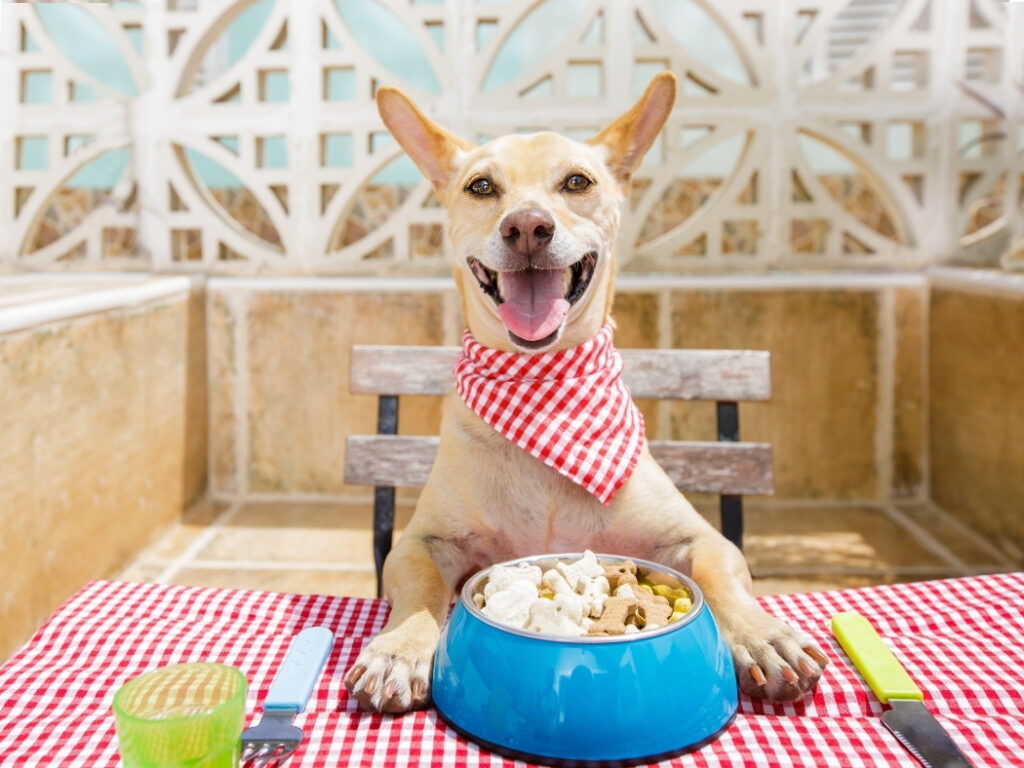
Ok, so now we’re back to the normally (but still gross) things that dogs do.
Let’s face it, our loveable little puppies (and, yes, I call all dogs puppies no matter how old they are) can be disgusting sometimes. They like to eat things they shouldn’t eat. They like to lick things they shouldn’t lick. They use their mouths to carry stuff they shouldn’t carry.
All of those things can leave particles on and between their teeth that can lead to stinky dog breath. And then they shove those cute – but stinky – faces up into ours.
Some of these habits can translate directly into bad breath.
For example, if your sweet little dog is a garbage hound, then the bad breath is probably a result of snacking on things they shouldn’t be snacking on.
Plus, for some unknown reason, dogs love those delectable treats known as cat poop – particularly when they are covered with pee-flavored sprinkles (aka kitty litter). So that adorable kitten could be adding to that not-so-adorable bad dog breath.
A household with cats and dogs can lead to some smelly – and unhygienic – snacking.
And even if cat poop isn’t readily available, some of our favorite furry friends like to eat their own poop. After all, it was delicious the first time around – why not go for seconds??
My neighbour, years ago, had a big old husky that loved to snack on their own piles of poop. She was constantly racing the clock to scoop it up before he could lap it up. It was not pleasant.
Treating Seriously Bad Dog Breath
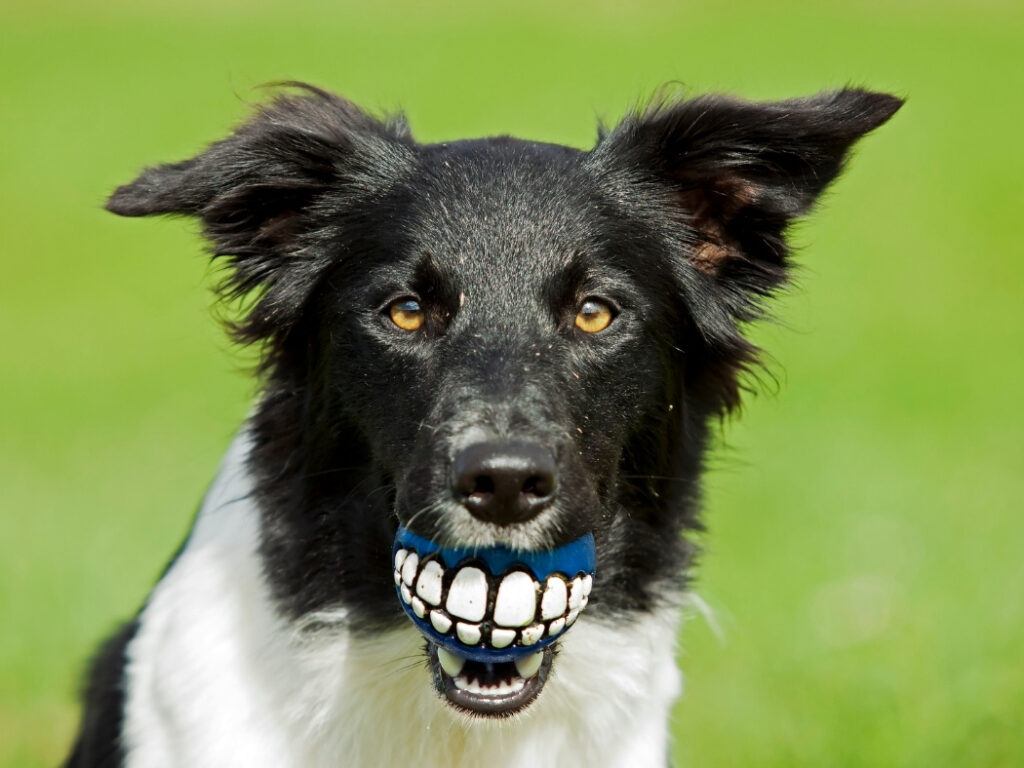
Once you’ve identified – and ruled out some of the more serious – causes of stinky dog breath, you can turn your attention to freshening up your puppy’s mouth in a variety of ways.
For example, if your dog is older and a significant build up of plaque, tartar, and – hopefully not – periodontal disease has set in and creating that malodorous aroma, your best course of action is to schedule an appointment with your veterinarian to talk about dental cleaning or other dental work.
You remember that Schnauzer I told you about? After some serious dental work, including the removal of several rotten teeth, her breath is as fresh as roses again.
If the problem is being caused by what they eat (garbage, poop, cheap dog food) you may need to change some of your dog’s (and your own) habits to help resolve this issue. Consider it as an extra step in puppy-proofing your home! This can include changing where you store your kitchen trash so that the pooch can’t poach your leftovers, or it could mean moving the litter box to a place that is outside of his or her reach.
The more serious conditions – including diabetes, liver, or kidney disease will intervention by a qualified veterinarian. However, once the underlying issue is resolved, your dog’s bad breath should also resolve itself. So, it’s a win-win.
Preventing Every-Day Stinky Breath in Dogs
For those of us with run-of-the-mill stinky dog breath issues, there are some things you can do around the home to help deal with the buildup of plaque, tartar, and bacteria that can cause your dog’s breath to be less than pleasant.
Doggy Toothbrushes
Some will tell you that the simplest way to deal with this issue is by investing in a doggy toothbrush and some dog-safe toothpaste.
While that might be the case if you start young enough, getting an adult dog used to the very foreign process of getting their teeth brushed can be quite futile (as I personally discovered). Even the peanut-butter flavored toothpaste didn’t help.
I haven’t completely given up on the idea. After all, brushing teeth is a proven way to reduce plaque and promotes better oral hygiene in general (or so my dentist tells me). Perhaps with a little more training & practice, my little Charlie will learn to enjoy having his teeth brushed. Perhaps.
Carrots
In the meantime, Charlie LOVES carrots. And carrots are great for doggy-vision (I actually don’t know that I’m just assuming because they say that carrots are good for vision in other animals, but I’ve never really read the scientific studies to see if that’s true or not).
But one of the other benefits of a nice, big carrot is that it serves as a natural and healthy alternative to brushing and manufactured dog bones and will help scrape the plaque – and the accompanying bacteria – off their teeth.
Chew Toys
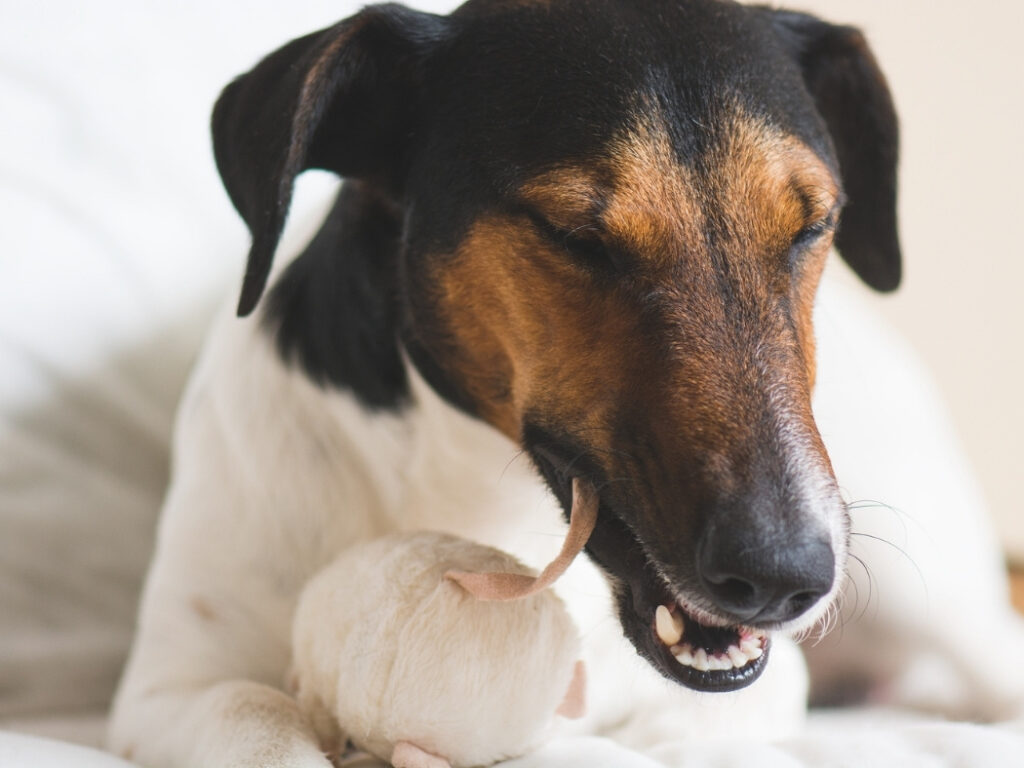
If your puppy isn’t a fan of carrots, or you’re not a fan of the leftover bits of carrot on your floor (yes, that happens sometimes), a well-structured chew toy can do the trick. The trick is to find the right one that your dog enjoys chewing but can’t destroy in 17 seconds.
Chewing – even if it’s on a rubber toy – prevents plaque and tartar build-up. Plus, dogs love to chew stuff and it’s better a toy than your favorite pair of Italian leather shoes.
Make sure you select chew toys appropriate for your dog’s size, age, and whether or note they are considered an aggressive chewer. These things are not always connected. My niece’s husky – a breed which is often considered an aggressive chewer – loved this one rubber chew toy and played with it daily for months.
I bought the exact same toy for Charlie and he had it in rubber bits and pieces in less than 3 minutes.
Other “indestructible” chew toys had so little give to it that Carlie had very little interest.
Eventually, I was able to find a toy that he loved to spend his time chewing but did not crumble in his mid-sized mouth. I bought 12 of them, so I’m set for a while.
Coconut Oil
Coconut oil has so many benefits around the house. It makes a FANTASTIC hair mask (just saying) and also helps ease dry skin. What I didn’t know, until I went on the hunt for a cure for bad dog breath, was that coconut oil also contains antiviral, antibacterial, and anti-fungal properties that help in reduce the buildup of bacteria in your dog’s mouth.
Just add a couple of teaspoons (depending on your dog’s size, you may need more or less) of coconut oil to your dog’s food. Not only can it help fight bacteria and make dog’s mouth smell like a day at the beach, but the coconut oil is also very good for their coat.
The only thing about coconut oil is that at room temperature it is more of a solid (like lard), so you may need to pop it in the microwave for a few seconds to make it easier to mix with their food.
Top-Quality Dog Food
Providing a healthy, balanced diet based on quality dog food can help your dog’s overall health, which includes their breath.
Yes, sometimes we can be tempted to buy the cheapest dog food possible… after all, they’re a dog – they’ll eat anything. But healthy ingredients can promote a healthy mouth.
Plus, keeping your dog healthy can help avoid some of the other – more serious – causes of bad breath.
Dental Sticks
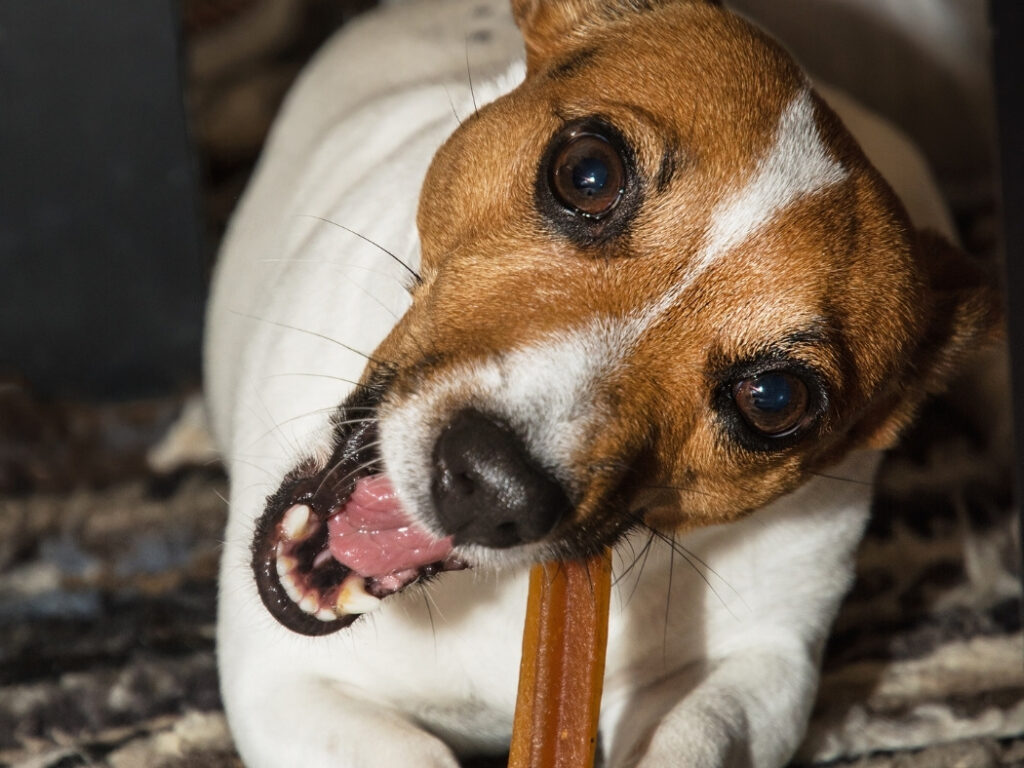
Similar to chew toys – but fully edible – dental sticks are purposefully formulated to help clear plaque and tartar from your dog’s teeth.
Unlike your standard dog biscuits, dental sticks tend to be a bit more solid and shaped with ridges or edges that were developed to get those pesky bits of target off your dog’s smile. They also tend to be a bit more expensive.
Yogurt
I will admit that this one surprised me when I read about it. But it turns out that the bacteria in a dog’s mouth can excrete hydrogen sulfide. This causes a bit of a “rotten egg smell” inside a dog’s mouth. Yogurt can sometimes counteract this type of bacteria which will reduce the hydrogen sulfide and therefore improve their breath.
Mixing a bit of plain yogurt into your dog’s food can help fight some of the unpleasant smells caused by bacteria. Plus, yogurt is high in calcium, which will help promote stronger teeth and healthier bones.
Probiotics
Sometimes, your dog’s breath isn’t just coming from their mouth. Sometimes, they have an imbalance of bacteria in their intestinal tract, and the smell ends up leaking out through their mouth (or other ways, which are equally unpleasant).
Adding natural, beneficial bacteria can not only help fight the bad bacteria in your dog’s mouth, but it can also help with their overall digestive system. But don’t go feeding them from that bottle of probiotics that you bought for yourself but never used. You need to make sure that you purchase a brand that is formulated for canine digestive systems.
Large Chunk Dog Food
Many people assume that big dog food is only for big dogs, but that can actually backfire on you. The larger the chunks, the more a dog needs to chew it. And the more a dog chews, the more plaque they scrape off their teeth in the process.
If you have a smaller dog, consider feeding them larger chunks of dog food.
For Charlie, I do something a little bit different. I buy the Hill’s Science Diet Adult Oral Care Dog Food, but he doesn’t get it as his daily meal (it’s just a tad too pricey for that). Instead, I use these as his dog treats instead of the bargain basement dog biscuits.
Dog Breath Water Additives
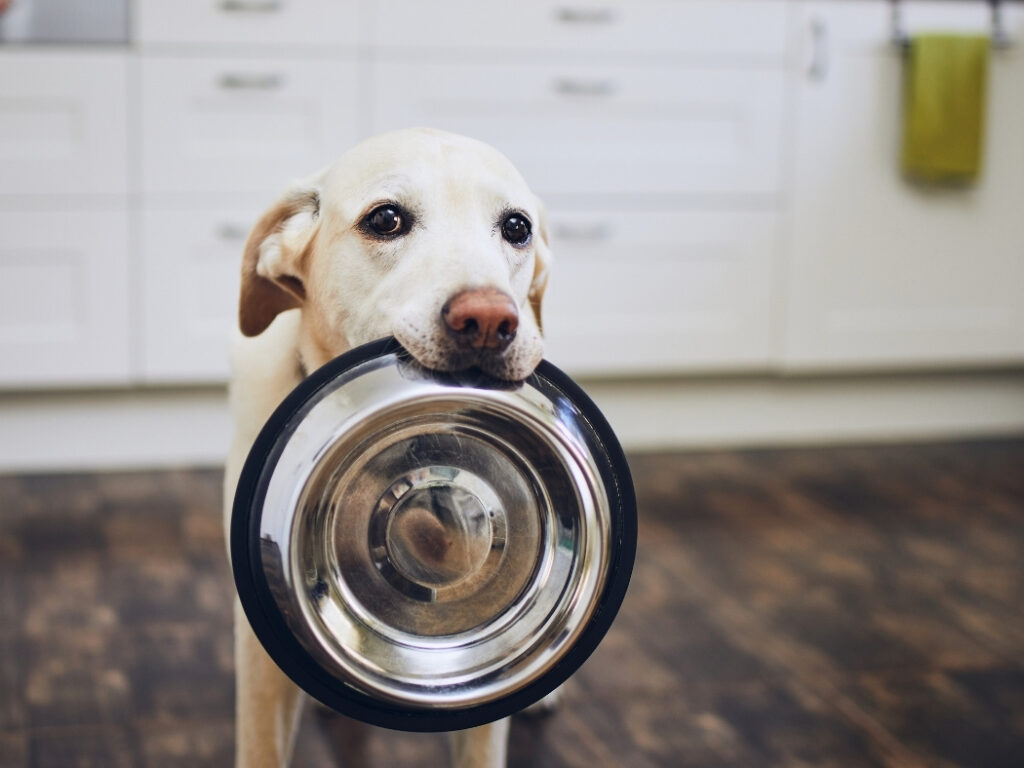
Adding a bit of something-something to their daily drinking water can be a bit of a breath buster. There are additives that are commercially available, such as the CLENZ-A-DENT Water Additive. It uses something they refer to as “a natural ingredient called RF2” which is actually rheum officinale – aka rhubarb root powder.
The high acid in citrus fruits – such as lemon juice – is also known to help kill off bacteria and serve as a natural deodorizer.
And adding just a capful (about a teaspoon) of apple cider vinegar to your dog’s water bowl can puts the power of malic and acetic acid to work killing the bacteria that causes bad breath. Apple Cider vinegar also contains a blend of minerals such as potassium, calcium, and magnesium, all of which play a vital role in supporting the overall health of your pooch’s mouth.
But ALWAYS remember to check to make sure that your particular pooch can handle whatever you add to their food or water, and don’t assume that if it’s safe for human’s that it’s safe for dogs. For example, you should NOT add a few drops of your household mouthwash to your dog’s water bowl. Although it is considered non-tox, it is not recommended and is not healthy for your pet.
After all, we’re not built the same, no matter how much of a little, fur-covered person they may seem to you some days.
A Final Note About Stinky Dog Breath (and How to Treat It)
Please keep in mind that I am not a vet. I am just a dude with a dog trying to deal with the same stinky dog breath issues that brought you here.
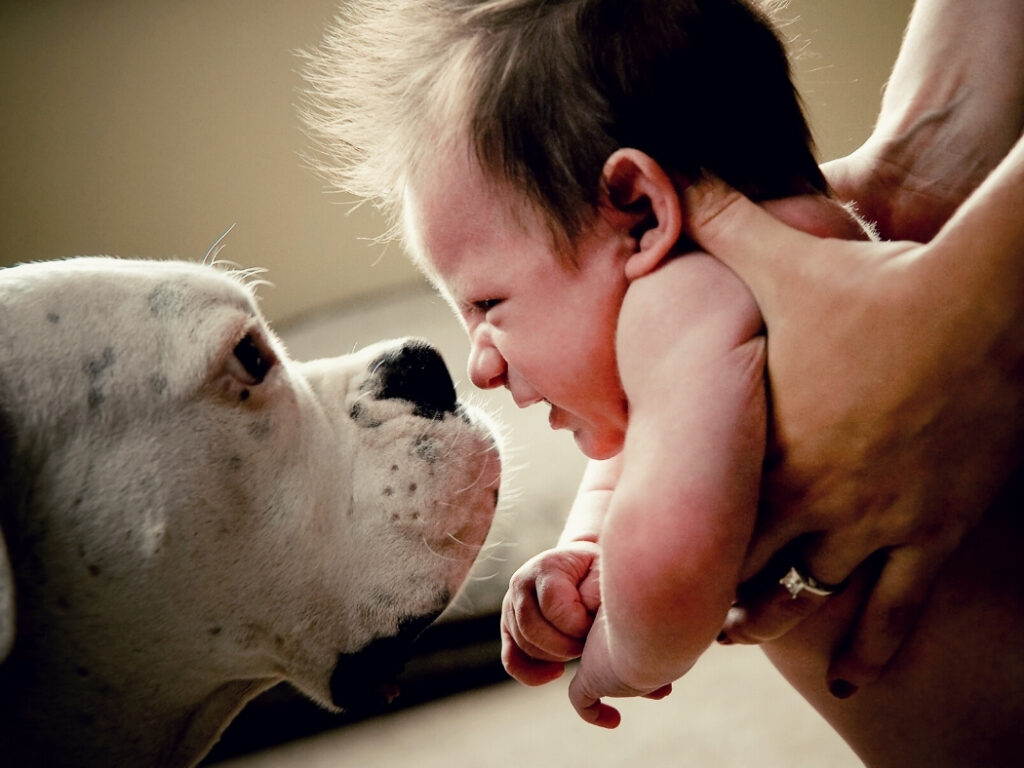
If you have any questions or concerns about any of the ideas noted above, please consult with your veterinarian. Information on the internet is helpful, but it’s not always perfect. Neither am I.
And last – but not least – just because they are super cute, here is a collection of pictures of dogs getting their lick on! (Which is a whole lot more loveable when their breath doesn’t smell like zombies!)



















